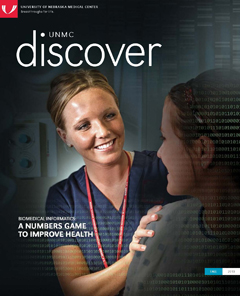Julie Oestreich, Pharm.D., Ph.D., knows prescription drugs don’t work the same for everyone.
But she wants to better understand how genes influence individual drug responses so doctors can prescribe the drug and dosage that works best for the patient being treated.
“I want to know how medicines work and how they change the body to create good — and to sometimes cause harm. Throw genetics into the picture and it’s an interesting and important area of study.”
|
The use of genetic information to guide treatments is growing as physicians better predict who will benefit from a drug, who will not respond at all or who will experience a negative side effect.
An assistant professor of pharmacy practice in the College of Pharmacy, Dr. Oestreich (pronounced ace-try) researches personalized anti-platelet therapy (which medicines, and how much, work best) and genetic tests for risk factors for cardiovascular events among the area’s American Indian population.
She drives to Martin, S.D., and its surrounding area to find and interact with her research participants. Together, the UNMC team collaborates with Lyle Best, M.D., and Turtle Mountain Community College at Belcourt, N.D. Both entities also work with Missouri Breaks Industries Research Inc., which is American Indian-owned and has offices on both the Pine Ridge and Cheyenne River Sioux Reservations in South Dakota.
The project goes through not just UNMC’s Institutional Review Board (IRB) but one with the tribe itself, and one with the Aberdeen Area Indian Health Service.
Dr. Oestreich previously had been interested in the variability of platelet function and response to antiplatelet agents with regard to protecting people from adverse cardiovascular events. She was intrigued by the idea that ethnicity might be one factor in this variability.
After studies with a small group of American Indians, the team now plans to expand its research to a larger population and further test whether genetic variants impact drug response. Finding answers, she knows, will benefit patients far into the future.
“We don’t want to leave a population behind,” she said.

